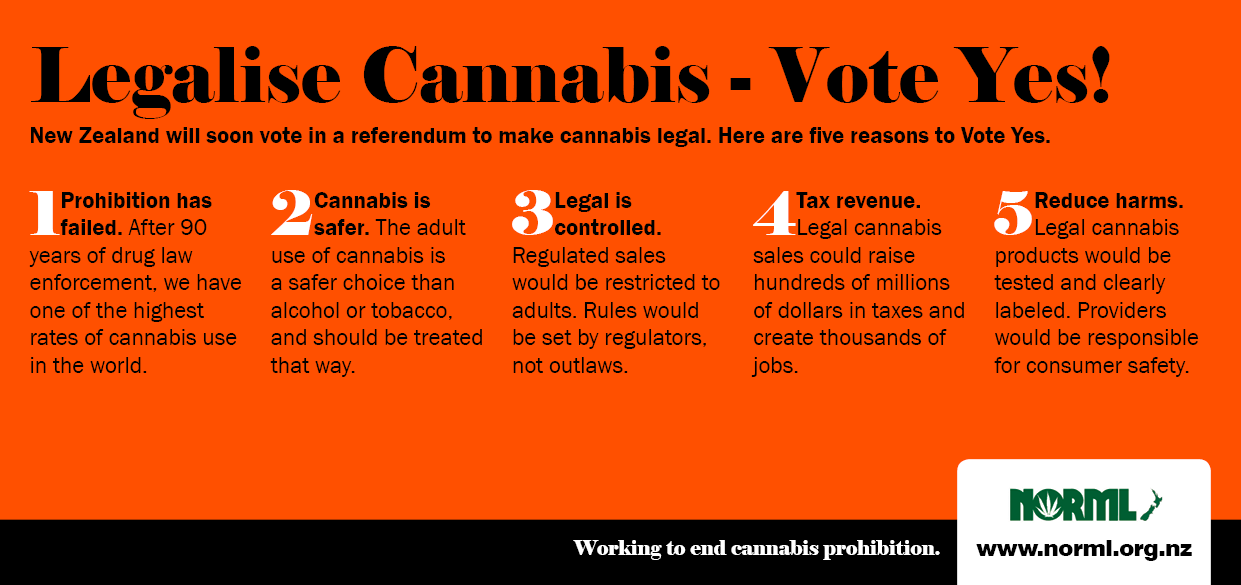
NORML New Zealand endorses the referendum’s Cannabis Legalisation and Control Bill, and recommends you enrol and vote Yes!
VOTING IS OPEN 3-17 OCTOBER 2020. You must be enrolled to vote in the cannabis referendum.

URGENT FUNDRAISING APPEAL: with polls showing support evenly split, every vote will count. Please donate now. We need your support to stop the arrests, end the injustice, restore people’s rights, increase health and safety, break the link with hard drugs, make our communities safer, give police better things to do…
Donate here to NORML (ASB 12-3057-0594667-00); Donate to our friends at Make It Legal into their account (Kiwibank 38-9020-0524953-00) or via Give-A-Little.
Answers to Frequently Asked Questions – get the information you need from MakeItLegal.nz
Check out the NZ Drug Foundation referendum campaign pack – includes how to have a conversation, and how to amplify your impact. Download PDF here (0.5mb).
As part of their coalition agreement, the Green Party secured a cannabis referendum to be held at the next election (NOW OCTOBER 17, 2020).
The Government has now produced a Bill for the referendum. Although not binding, all parties that make up the Government have agreed to implement the result.
The referendum Bill draws on aspects of two models developed for New Zealand and endorsed by NORML: the CHOISE model and the NZ Drug Foundation’s Model Drug Law.
Information about the referendum
You must be enrolled to vote in the referendum. Election day is Saturday 17 October, 2020. You can vote from 3 October to 17 October. You can enrol from now, either online or over the phone (0800 36 76 56) or at any PostShop. This year, for the first time, you can even enrol at the time you vote, and voting booths will also be in easy-to-find places like supermarkets.
The question
The question is: “Do you support the proposed Cannabis Legalisation and Control Bill?”
- Yes, I support the proposed Cannabis Legalisation and Control Bill
- No, I do not support the proposed Cannabis Legalisation and Control Bill.
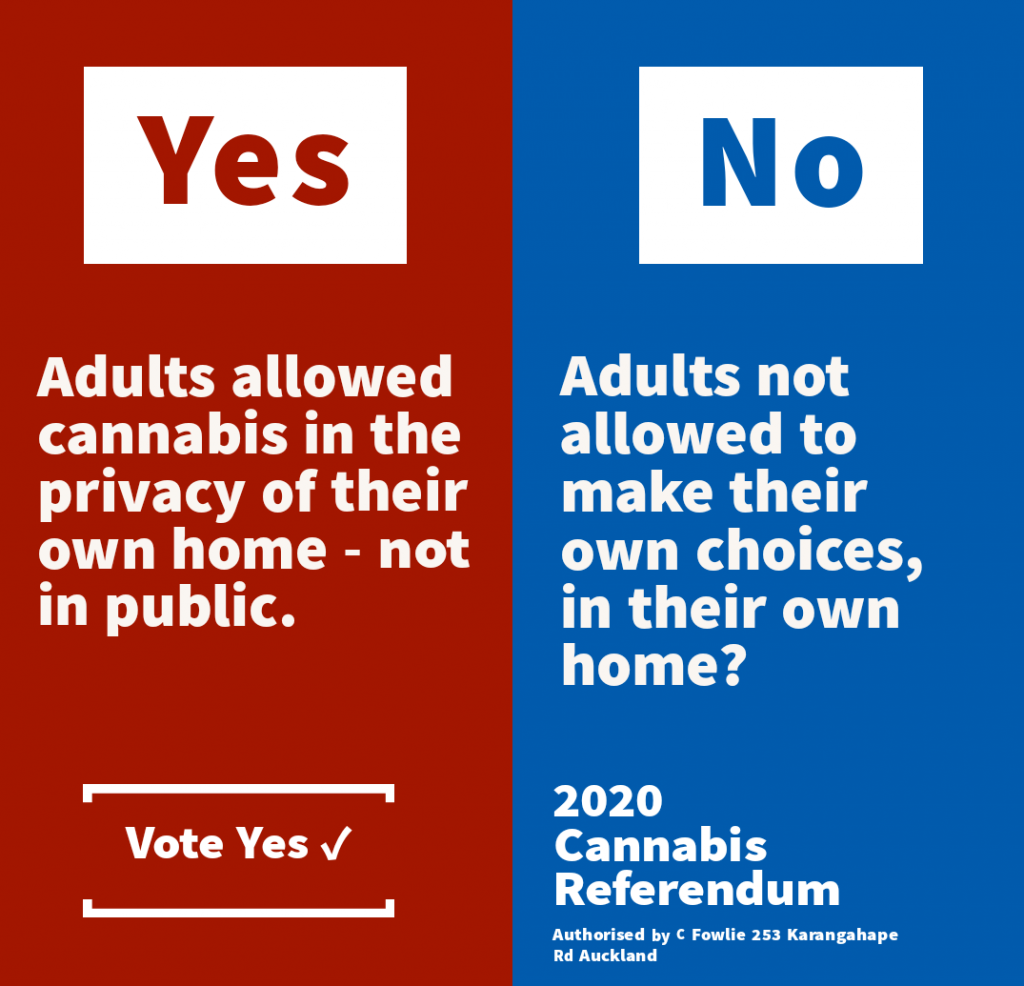
Main features
The purpose of the Bill is to reduce harm from cannabis use by regulating and controlling all aspects of the supply chain, including growing, preparing, consuming, and selling cannabis in New Zealand. The Bill does this by:
- providing access to legal cannabis that meets quality and potency requirements
- eliminating the illegal supply of cannabis
- raising awareness of the health risks associated with cannabis use
- restricting young people’s access to cannabis
- limiting the public visibility of cannabis
- requiring health warnings on packaging and at the time of purchase
- improving access to health and social services, and other kinds of support for families/whānau
- making sure the response to any breach of the law is fair, encourages compliance, and reduces overall harm.
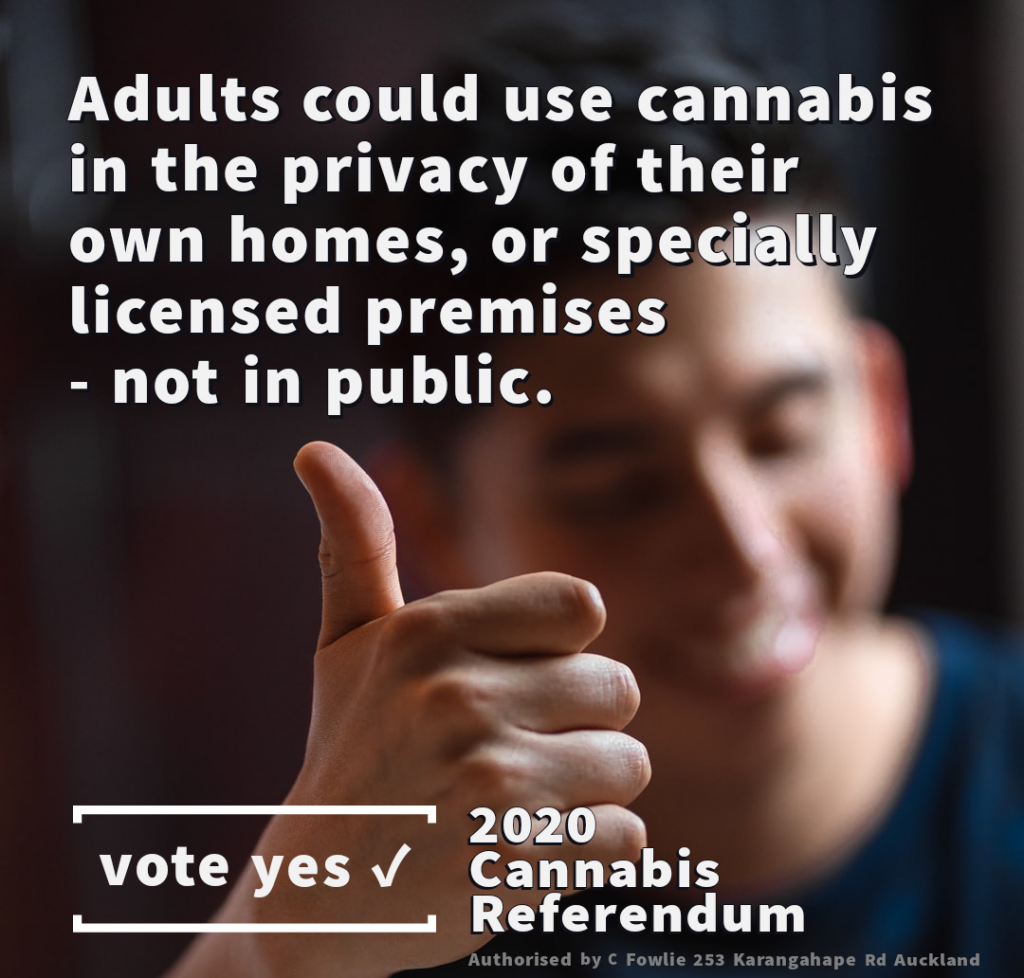
Age limit: A person would need to be 20 years or older to grow, possess or consume cannabis.
Selling or supplying cannabis to any person under the age of 20 would be an offence under the Bill.
A person under age 20 found in possession of cannabis would receive a health-based response such as an education session, social or health service, or they would pay a small fee or fine. This would not lead to a conviction.
Home growing: A person aged 20 or over could grow up to 2 plants. If more than 1 person aged 20 or over lives in the same household, the maximum number is 4 plants per household. The plants would have to be either grown out of public sight or inaccessible from a public area.
Consumption: People would be able to consume cannabis in private residences and in licensed cannabis consumption premises, which may be similar to cafes. A person could not consume cannabis in a public place, or in a vehicle that is in a public place.
Possession: A person could possess up to 14 grams of dried cannabis (or its equivalent) in a public place or in a vehicle in a public place (some exceptions would apply, such as when moving from 1 permanent residence to another).
Purchases: Cannabis could only be bought from licensed cannabis retailers in New Zealand. A person could not be sold more than 14 grams of dried cannabis (or its equivalent) per day. Cannabis could not be delivered by mail or courier.
Controls around sales: There would be a complete ban on advertising cannabis or cannabis products in New Zealand. People younger than 20 would not be able to enter retail or consumption premises — even if they were with someone aged 20 or over.
Packaging: The Bill includes packaging regulations, such as standardised packaging, health messaging, and branding. Product labels would state the product’s equivalence to the daily purchase limit; the amount of THC and CBD in the product; a list of ingredients and any harmful ingredients including any allergens. The Authority could also require packaging to have messages about any harmful consequences of using cannabis.
Premises: Consumption and retail premises must appoint duty managers, responsible for complying with the law. Licence holders and managers would make sure:
- impaired people are not sold or supplied cannabis
- impaired people are encouraged to remain on the premises until the immediate effects of cannabis wear off
- no violent, quarrelsome, insulting, or disorderly conduct takes place on the premises.
(A person would be considered impaired if that person’s mental abilities, physical capabilities, or both, are observably reduced after they have consumed alcohol or other drugs.)
Consumption premises would have to provide water and conventional food. In addition to packaging regulations all retailers and wholesalers would display messaging at the point-of-sale that consuming cannabis is harmful. Harm-reduction messages and information about support services would also be on display.
Sales taxes go to health and education: the Bill proposes a mix of excise taxes, sales levies, and licence fees. Levies will be used to support harm-reduction orientated health and education services in local communities.
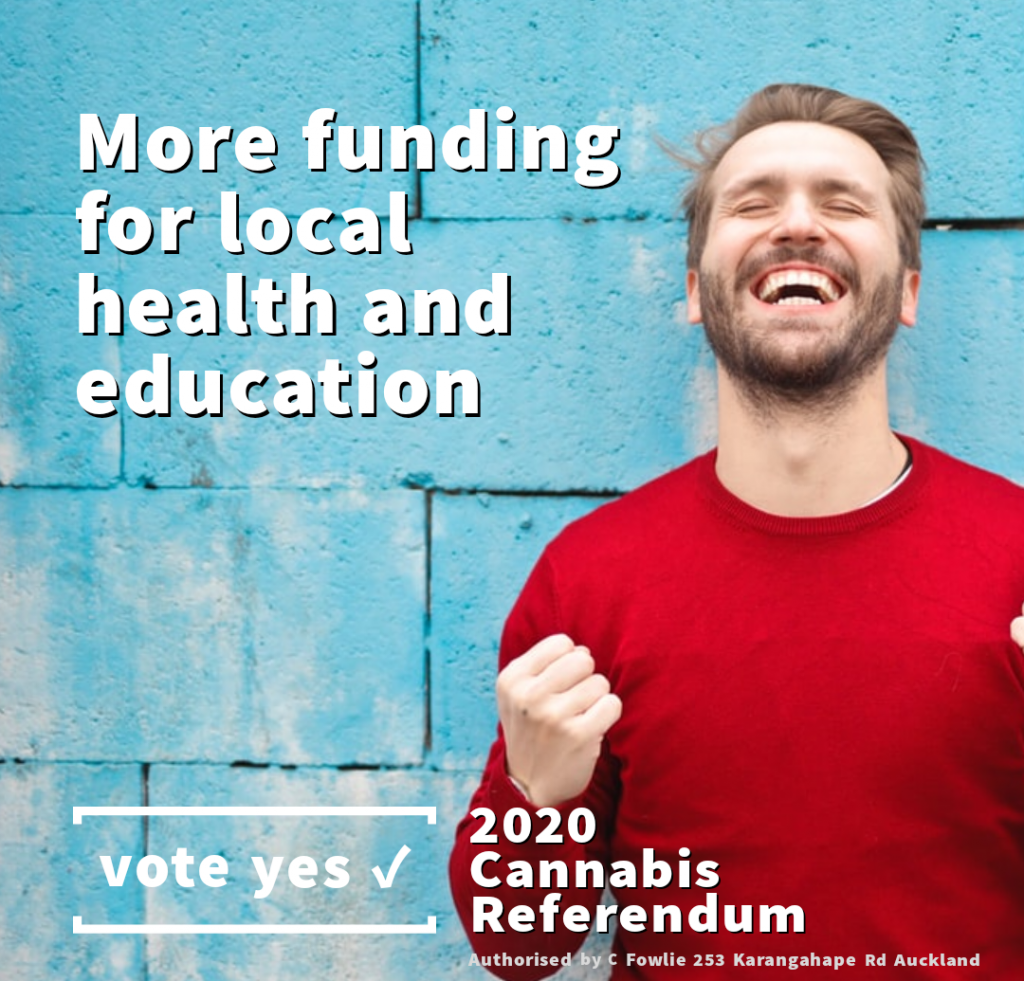
Smoking is discouraged: The Bill includes provisions to educate people about the health impacts of smoking cannabis and ways to consume cannabis that do not involve smoking. The Bill includes a specific provision to ban smoking and vaping cannabis in enclosed spaces in the presence of those under 20. Second-hand smoke is already addressed through the Smoke-Free Environments Act. The Bill aligns with the Smoke-Free Environments Act 1990.
Driving and workplace safety are covered by existing law: Drug driving is already an offence under the Land Transport Act 1998. The Bill would not replace the existing law. Other laws already cover working while impaired. The Bill would not replace existing laws.
Licence allocation will support local communities: Individuals and businesses would apply to the Cannabis Regulatory Authority [holding name only] for a licence to grow, produce or supply cannabis. The Authority will set a total market quota and invite applications to supply a portion of that quota. No single entity may control more than 20% of the quota (or “cap”), and 20% is also set aside for small scale “micro cultivators”.
When deciding who to give licences to, the Authority would consider the degree to which the licence applicant represents or partners with communities disproportionately harmed by cannabis; generates social benefit and builds community partnerships; and/or promotes employment opportunities and career pathways. This means those who want just make money will be at the bottom of the pile while those who have genuine partnerships that benefit their communities will go to the front of the queue. This will spread the benefits so cannabis legalisation benefits everyone.
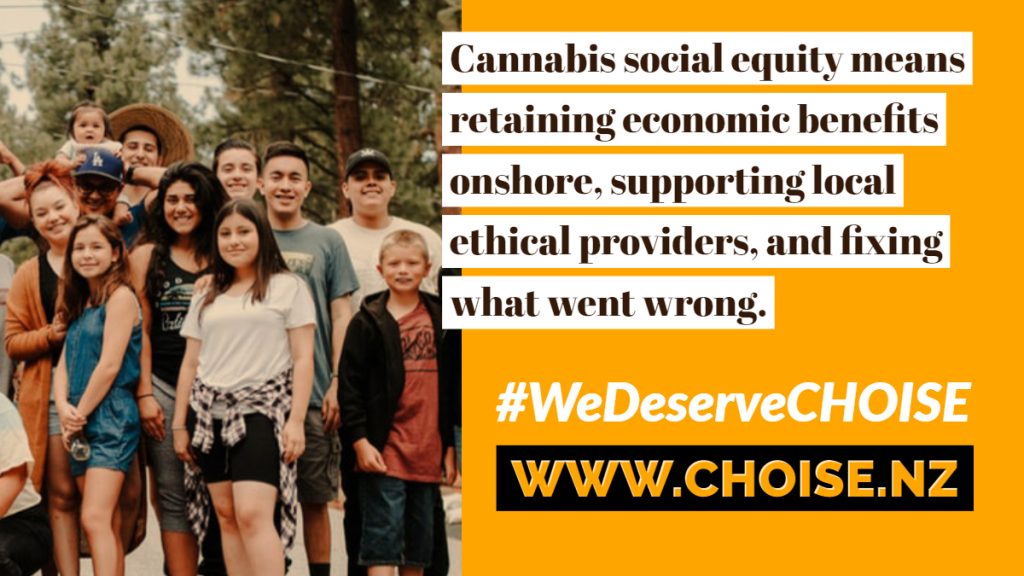
The Authority would make decisions on where cannabis consumption premises and retail premises would be located, on a case-by-case basis. Communities could be involved by:
- taking part in the development of local licensed premises policies, including how close retail and consumption premises should be to schools, places of worship and other community facilities
- making public submissions on licensing applications.
Find out more
Read NORML’s articles and news about the cannabis referendum.
The referendum bill can be read at referendums.govt.nz or for a quick read there is summary of the Bill, a list of Frequently Asked Questions, or read the technical guide (warning: 40 pages!).
The Helen Clark Foundation has produced “The case for Yes” and supports the Yes campaign
The Prime Minister’s Chief Science Advisor is compiling evidence about cannabis and the law in New Zealand, and maintains a list of high quality news articles about the cannabis referendum.
The New Zealand Drug Foundation has very good information about the referendum including how you can talk to other people about it. The Drug Foundation’s Yes On Our Terms site shows how the version of legalisation developed for the referendum is unique to New Zealand.
The referendum model promotes the concept of “social equity” in licence allocation. Learn more about cannabis social equity at CHOISE.nz
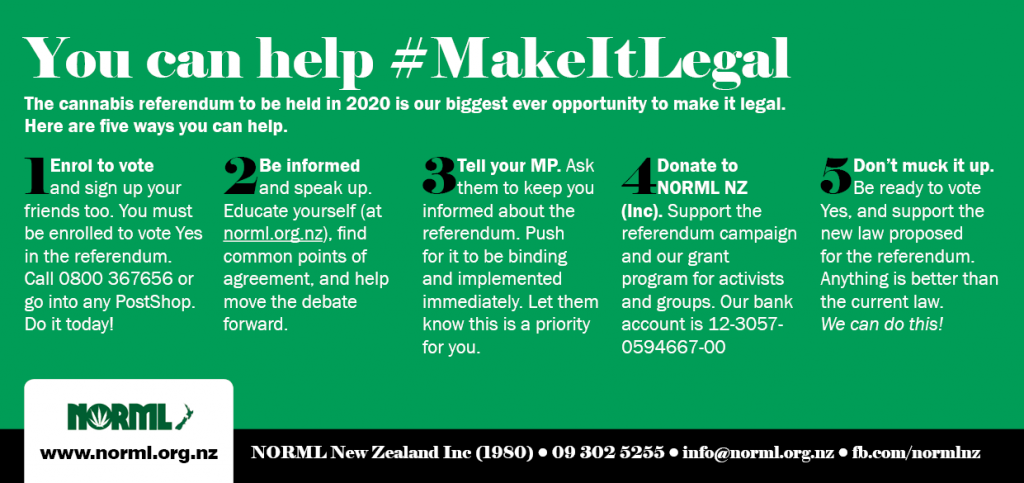
Get involved and support a positive result
We need your support to win this referendum. Get involved, spread our messages, memes, videos, links and news. Have that conversation with people you know. Donate to support the Yes vote. Fundraising in your community helps spread awareness, generates much needed funds, and shows locals we can have positive impacts. .
NORML supports the Make It Legal campaign. Donate at GiveALittle here.
Get involved with Make It Legal here.
NORML also supports the NZ Drug Foundation’s Yes On Our Terms campaign. Donate at PledgeMe here.
Sign up to Health Not Handcuffs here.
Students – get involved with Yes2020 here.
You must be enrolled to vote in the referendum! Enrol to vote here.

